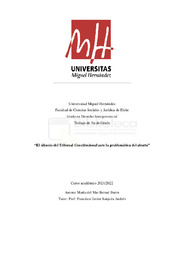Por favor, use este identificador para citar o enlazar este ítem:
https://hdl.handle.net/11000/28089Registro completo de metadatos
| Campo DC | Valor | Lengua/Idioma |
|---|---|---|
| dc.contributor.advisor | Sanjuán Andrés, Francisco Javier | - |
| dc.contributor.author | Bernal Ibarra, María del Mar | - |
| dc.contributor.other | Departamentos de la UMH::Ciencia Jurídica | es_ES |
| dc.date.accessioned | 2022-10-27T11:02:53Z | - |
| dc.date.available | 2022-10-27T11:02:53Z | - |
| dc.date.created | 2022-06 | - |
| dc.identifier.uri | https://hdl.handle.net/11000/28089 | - |
| dc.description.abstract | El presente trabajo de final de grado pretende ser una aproximación a la realidad social del aborto en España. Cómo su regulación planteó por parte del gobierno del partido popular el recurso de inconstitucionalidad nº 4325/2010 frente a varios preceptos supuestamente “inconstitucionales” de la ley orgánica 2/2010, de 3 de marzo, de salud sexual y reproductiva y de la interrupción voluntaria del embarazo, a fin de que fuera resuelto lo antes posible por nuestro alto tribunal. El tema del aborto ha ido evolucionando junto con los cambios sociales y políticos que España ha tenido a lo largo de su historia, dada su gran carga personal, íntima, moral e ideológica que tiene este concepto. El objetivo principal del presente trabajo es, por un lado, concienciar a la sociedad que el problema del aborto es un hecho real, que existe y que es de pura actualidad. Además, se hace necesario saber cómo se va a resolver por parte del TC dicha controversia ya que, al estar íntimamente ligado con los derechos inherentes de la persona, la sociedad debe de poder esclarecer todas las dudas y conjeturas que puedan darse a la hora de tomar decisiones que se relacionen con el aborto y sus derechos. Y, por otro lado, dar voz a los silencios por parte del tribunal constitucional ante las resoluciones de los recursos de inconstitucionalidad planteados hasta el momento sobre diferentes materias y, concretamente sobre el objeto de este trabajo como es el aborto. Parece ser que, el mínimo común de todas estas materias sin resolver por parte del constitucional está vinculadas con aspectos ideológicos, morales y éticos, muy personales e íntimos para quien le afecta, pero la pregunta que nos hacemos es ¿debe por este motivo estar justificado décadas de retraso por parte del tribunal constitucional en la resolución de conflictos entre derechos? | es_ES |
| dc.description.abstract | This Final Degree Project aims to be an approach to the social reality of abortion in Spain. How its regulation raised by the Government of the Popular Party the appeal of unconstitutionality No. 4325/2010 against several allegedly "unconstitutional" precepts of the Organic Law 2/2010 of March 3, on sexual and reproductive health and voluntary termination of pregnancy, in order to be resolved as soon as possible by our High Court. The issue of abortion has evolved along with the social and political changes that Spain has undergone throughout its history, given the great personal, intimate, moral and ideological burden that this concept has. The main objective of the present work is, on the one hand, to make society aware that the problem of abortion is a real fact, that it exists and that it is a very topical issue. In addition, it is necessary to know how the TC will resolve this controversy since it is closely linked to the inherent rights of the person, society must be able to clarify all the doubts and conjectures that may arise when making decisions related to abortion and their rights. And, on the other hand, to give voice to the silences on the part of the Constitutional Court before the resolutions of the appeals of unconstitutionality raised so far on different matters and, concretely on the object of this work as it is abortion. It seems that the minimum common denominator of all these matters unresolved by the Constitutional Court is linked to ideological, moral and ethical aspects, which are very personal and intimate for those who are affected, but the question we are asking ourselves is Should this justify decades of delay on the part of the Constitutional Court in resolving conflicts between rights? | es_ES |
| dc.format | application/pdf | es_ES |
| dc.format.extent | 73 | es_ES |
| dc.language.iso | spa | es_ES |
| dc.publisher | Universidad Miguel Hernández de Elche | es_ES |
| dc.rights | info:eu-repo/semantics/openAccess | es_ES |
| dc.rights | Attribution-NonCommercial-NoDerivatives 4.0 Internacional | * |
| dc.rights.uri | http://creativecommons.org/licenses/by-nc-nd/4.0/ | * |
| dc.subject | aborto | es_ES |
| dc.subject | derechos fundamentales | es_ES |
| dc.subject | conflicto | es_ES |
| dc.subject | recurso inconstitucional | es_ES |
| dc.subject | TC | es_ES |
| dc.subject | abortion | es_ES |
| dc.subject | fundamental rights | es_ES |
| dc.subject | conflict | es_ES |
| dc.subject | unconstitutional appeal | es_ES |
| dc.subject | Constitutional Court | es_ES |
| dc.subject.other | CDU::3 - Ciencias sociales::34 - Derecho | es_ES |
| dc.title | El silencio del Tribunal Constitucional ante la problemática del aborto | es_ES |
| dc.type | info:eu-repo/semantics/bachelorThesis | es_ES |

Ver/Abrir:
TFG-Bernal Ibarra, María del Mar.pdf
2,02 MB
Adobe PDF
Compartir:
 La licencia se describe como: Atribución-NonComercial-NoDerivada 4.0 Internacional.
La licencia se describe como: Atribución-NonComercial-NoDerivada 4.0 Internacional.
.png)